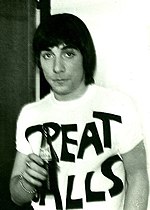The Rock Music Portal
Rock is a broad genre of popular music that originated as "rock and roll" in the United States in the late 1940s and early 1950s, developing into a range of different styles from the mid-1960s, particularly in the United States and the United Kingdom. It has its roots in rock and roll, a style that drew directly from the genres of blues, rhythm and blues, and country music. Rock also drew strongly from genres such as electric blues and folk, and incorporated influences from jazz and other musical styles. For instrumentation, rock is centered on the electric guitar, usually as part of a rock group with electric bass guitar, drums, and one or more singers. Usually, rock is song-based music with a 4
4 time signature using a verse–chorus form, but the genre has become extremely diverse. Like pop music, lyrics often stress romantic love but also address a wide variety of other themes that are frequently social or political. Rock was the most popular genre of music in the U.S. and much of the Western world from the 1950s to the 2010s.
Rock musicians in the mid-1960s began to advance the album ahead of the single as the dominant form of recorded music expression and consumption, with the Beatles at the forefront of this development. Their contributions lent the genre a cultural legitimacy in the mainstream and initiated a rock-informed album era in the music industry for the next several decades. By the late 1960s "classic rock" period, a few distinct rock music subgenres had emerged, including hybrids like blues rock, folk rock, country rock, Southern rock, raga rock, and jazz rock, which contributed to the development of psychedelic rock, influenced by the countercultural psychedelic and hippie scene. New genres that emerged included progressive rock, which extended artistic elements, heavy metal, which emphasized an aggressive thick sound, and glam rock, which highlighted showmanship and visual style. In the second half of the 1970s, punk rock reacted by producing stripped-down, energetic social and political critiques. Punk was an influence in the 1980s on new wave, post-punk and eventually alternative rock.
From the 1990s, alternative rock began to dominate rock music and break into the mainstream in the form of grunge, Britpop, and indie rock. Further fusion subgenres have since emerged, including pop-punk, electronic rock, rap rock, and rap metal. Some movements were conscious attempts to revisit rock's history, including the garage rock/post-punk revival in the 2000s. Since the 2010s, rock has lost its position as the pre-eminent popular music genre in world culture, but remains commercially successful. The increased influence of hip-hop and electronic dance music can be seen in rock music, notably in the techno-pop scene of the early 2010s and the pop-punk-hip-hop revival of the 2020s. (Full article...)
General images -
Selected article
In 1999, Sum 41 signed an international record deal with Island Records and released its first EP, Half Hour of Power, in 2000. The band released its debut album, All Killer No Filler, in 2001. The album achieved mainstream success with its first single, "Fat Lip", which reached number one on the Billboard Modern Rock Tracks chart and remains the band's most successful single to date. The album's next singles "In Too Deep" and "Motivation" also achieved commercial success. All Killer No Filler was certified platinum in both the United States and the United Kingdom and triple platinum in Canada. In 2002, the band released Does This Look Infected?, which was also a commercial and critical success. The singles "The Hell Song" and "Still Waiting" both charted highly on the modern rock charts.
The band released its next album, Chuck, in 2004, led by singles "We're All to Blame" and "Pieces". The album proved successful, peaking at number 10 on the Billboard 200. In 2007, the band released Underclass Hero, which was met with a mixed reception, but became the band's highest-charting album to date. It was also the band's last album on Aquarius Records. The band released the album Screaming Bloody Murder, on Island Records in 2011 to a generally positive reception, though it fell short of its predecessors' commercial success. The band's sixth studio album, 13 Voices was released in 2016, through Hopeless Records. IMPALA awarded the album with a double gold award for 150,000 sold copies across Europe. The band's seventh studio album Order in Decline was released on July 19, 2019. It was the band's last album on Hopeless Records. The band's eighth studio album, Heaven :x: Hell, was released on March 29, 2024, through Rise Records. In May 2023, the band announced that the album would be their last as they would be disbanding after its release and a worldwide headlining tour.
The band often performed more than 100 times each year and holds long global tours, most of which lasted more than a year. The group was nominated for seven Juno Awards and won twice – Group of the Year in 2003, and Rock Album of the Year for Chuck in 2005. Sum 41 was nominated for a Grammy Award for Best Hard Rock/Metal Performance for the song "Blood in My Eyes". From their formation to 2016, Sum 41 were the 31st best-selling Canadian artist in Canada. (Full article...)
Selected biography
Moon grew up in Wembley and took up the drums during the early 1960s. After playing with a local band, the Beachcombers, he joined the Who in 1964 before they recorded their first single. Moon was recognised for his drumming style, which emphasised tom-toms, cymbal crashes, and drum fills. Throughout his tenure with the Who, his drum kit steadily grew in size, and (along with Ginger Baker) he has been credited as one of the earliest rock drummers to regularly employ double bass drums in his setup. Moon occasionally collaborated with other musicians and later appeared in films, but considered playing in the Who his primary occupation, and remained a member of the band until his death. In addition to his talent as a drummer, Moon developed a reputation for smashing his kit on stage and destroying hotel rooms on tour. He was fascinated with blowing up toilets with cherry bombs or dynamite, and destroying television sets. Moon also enjoyed touring and socialising, and became bored and restless when the Who were inactive. His 21st birthday party in Flint, Michigan, has been cited as a notorious example of decadent behaviour by rock groups.
Moon suffered a number of setbacks during the 1970s, most notably the accidental death of chauffeur Neil Boland and the breakdown of his marriage. He suffered from alcoholism and acquired a reputation for decadence and dark humour; his nickname was "Moon the Loon". While touring with the Who, on several occasions he passed out on stage and was hospitalised. By the time of their final tour with him in 1976, and particularly during production of The Kids Are Alright and Who Are You, the drummer's deterioration was evident. Moon moved back to London from Los Angeles in 1978, dying that September from an overdose of clomethiazole, a drug intended to treat or prevent symptoms of alcohol withdrawal.
Moon's drumming continues to be praised by critics and musicians. He was posthumously inducted into the Modern Drummer Hall of Fame in 1982, becoming the second rock drummer to be chosen, and in 2011 he was voted the second-greatest drummer in history by a Rolling Stone readers' poll. Moon was inducted into the Rock and Roll Hall of Fame in 1990 as a member of the Who. (Full article...)
Selected album
Arthur or the Decline and Fall of the British Empire, often referred to simply as Arthur, is the seventh studio album by the English rock band the Kinks, released on 10 October 1969. It was the first Kinks album to feature bassist John Dalton, who replaced Pete Quaife after the former’s departure. Kinks frontman Ray Davies constructed the concept album as the soundtrack to a Granada Television play and developed the storyline with novelist Julian Mitchell; the television programme was never produced. The rough plot revolved around Arthur Morgan, a carpet-layer, who was based on Ray and guitarist Dave Davies' brother-in-law Arthur Anning. A stereo version was released internationally with a mono version being released in the UK, but not in the US.
The album was met with poor sales but nearly unanimous acclaim, especially among the American music press. Although Arthur and its first two singles, "Drivin'" and "Shangri-La", failed to chart in the UK, the Kinks returned to the Billboard charts after a two-year absence with "Victoria", the lead single in the US, peaking at number 62. The album itself reached number 105 on the Billboard Top LPs chart, their highest position for three years. Arthur paved the way for the further success of the Kinks' 1970 comeback album Lola Versus Powerman and the Moneygoround, Part One. (Full article...)
Selected song
"Purple Haze" is a song written by Jimi Hendrix and released as the second single by the Jimi Hendrix Experience on March 17, 1967, in the United Kingdom. The song features his inventive guitar playing, which uses the signature Hendrix chord and a mix of blues and Eastern modalities, shaped by novel sound processing techniques. Because of ambiguities in the lyrics, listeners often interpret the song as referring to a psychedelic experience, although Hendrix described it as a love song. It was included as the opening track in the North American edition of the Experience's debut album, Are You Experienced (1967).
"Purple Haze" is one of Hendrix's best-known songs and appears on many Hendrix compilation albums. The song featured regularly in concerts and each of Hendrix's group configurations issued live recordings. It was inducted into the Grammy Hall of Fame and is included on lists of the greatest guitar songs, including at number two by Rolling Stone and number one by Q magazine. In 2004 and 2010, the former ranked it at number 17 on its “The 500 Greatest Songs of All Time ” list, re-ranking it to number 250 in the 2021 edition. (Full article...)
Selected picture

Henrik Freischlader performing in Saarbrücken, Germany in 2009.
Did you know (auto-generated)

- ... that Rolling Stone listed Ácido Argentino as the most essential album of Argentine heavy metal?
- ... that heavy metal band Judas Priest took their name from Bob Dylan's song "The Ballad of Frankie Lee and Judas Priest"?
- ... that raw material waste from the West influenced a generation of rock music in China?
- ... that Canadian punk rock musician Talli Osborne had only briefly spoken to the frontman of NOFX before the band wrote a song about her?
- ... that heavy metal led Ossian D'Ambrosio to druidism?
- ... that the heavy metal band Cradle of Filth released a T-shirt that was so offensive that several people were arrested for wearing it?
Selected genre
Alternative rock (also known as alternative music, alt-rock or simply alternative) is a category of rock music that evolved from the independent music underground of the 1970s. Alternative rock acts achieved mainstream success in the 1990s with the likes of the grunge subgenre in the United States, and the Britpop and shoegaze subgenres in the United Kingdom and Ireland. During this period, many record labels were looking for "alternatives", as many corporate rock, hard rock, and glam metal acts from the 1980s were beginning to grow stale throughout the music industry. The emergence of Generation X as a cultural force in the 1990s also contributed greatly to the rise of alternative rock. (Full article...)
Selected audio
Related portals
WikiProjects
Things you can do
Expand: College rock, Electronic rock, Pop rock
Clean Up: Instrumental rock, Rap rock, New wave, Industrial rock, Progressive metal, Southern rock, Folk rock, Funk rock, Space rock
Add Sources: Pagan rock
Join one of the many WikiProjects pertaining to Rock music.
News
No recent news
More articles -
Physical Graffiti is the sixth album by the English rock band Led Zeppelin. Released as a double album on 24 February 1975 in the United States and on 28 February 1975 in the United Kingdom, it was the group's first album to be released under their new label, Swan Song Records. The band wrote and recorded eight new songs for the album in early 1974 at Headley Grange, a country house in Hampshire, which gave them ample time to improvise arrangements and experiment with recording. The total playing time covered just under three sides of an LP, so they decided to expand it into a double album by including previously unreleased tracks from the sessions for the band's earlier albums Led Zeppelin III (1970), Led Zeppelin IV (1971) and Houses of the Holy (1973). The album covered a range of styles including hard rock, progressive rock, rock 'n' roll and folk. The album was then mixed over summer 1974 and planned for an end-of-year release; however, its release was delayed because the Peter Corriston-designed die-cut album cover proved difficult to manufacture.
Physical Graffiti was commercially and critically successful upon its release and debuted at number one on album charts in the UK and number three in the United States. It was promoted by a successful U.S. tour and a five-night residency at Earl's Court, London. The album has been reissued on CD several times, including an expansive 40th anniversary edition in 2015. Physical Graffiti was later certified 16× platinum in the United States by the Recording Industry Association of America (RIAA) in 2006, signifying shipments of over eight million copies in the US. (Full article...)
More did you know...
- ... that David Bowie's first gig as lead singer was at the Green Man, Blackheath?
- ... that Carlton le Willows Academy alumni include cricketer Mark Footitt, Air Supply singer/guitarist Graham Russell, and balloonist Janet Folkes?
- ... that the video for Marilyn Manson's soft-rock ballad "Running to the Edge of the World" was widely condemned for its depiction of violence against women?
- ... that Susan Beschta was a punk rocker and federal judge?

- ... that the FM Non-Duplication Rule adopted by the FCC 60 years ago led to the creation of the album-oriented and classic rock radio formats?
- ... that The Elvis Dead, a retelling of Evil Dead II in the style of Elvis Presley, features songs such as "Standing in a State of Shock", "I've Been Possessed", and "Wrapped Up in Vines"?
Major topics
Subcategories
Associated Wikimedia
The following Wikimedia Foundation sister projects provide more on this subject:
-
Commons
Free media repository -
Wikibooks
Free textbooks and manuals -
Wikidata
Free knowledge base -
Wikinews
Free-content news -
Wikiquote
Collection of quotations -
Wikisource
Free-content library -
Wikiversity
Free learning tools -
Wikivoyage
Free travel guide -
Wiktionary
Dictionary and thesaurus













































